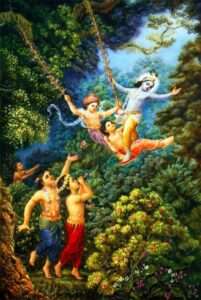With Namabhasa one obtains all the results of karma and brahma-jnana
Namabhase sarva-karma o brahma-jnanera phala haiya thake
Namabhasa grants all the results that one can have with karma, and through namabhasa one also has all the results of jnana.
If one connects with even a semblance of the Name[1], this produces a higher result. The Name has the power to reward much more.
The Sastra sing about the results of the Holy Name. Those people who take refuge in Suddha-nama will certainly obtain them.
Those who doubt the results of Nama do not get any auspiciousness
Nama-phale yahara sandeha tahara mangala nai
Those who doubt this are the most despicable men. They definitely fall due to this namaparadha.
In the beginning, middle and end of the Vedas, Ramayana, Maha-bharata and Puranas only Hari-nama is mentioned.
The results of Nama are found in the words of the Sruti which have no beginning and are immutable. How can such results be exaggerated or imaginary?
The Potency of The Name has Limitless Qualities which are Greater than the Potencies of Karma and Jnana
Karma-jnanera sakti apeksa ananta-guna-sakti name ache
The Name and the Named are one[2], and You have invested all Your powers in the Name[3]. Above all other methods, you have emphasized that nama-bhakti is the best of all.
You are the independent Reality and the Possessor of all potencies. By Your wish, the laws are imposed.
You have placed matter within karma and nirvana-sakti[4] within brahma-jnana because you are independent.
O Lord, being free to act according to Your desires, You have placed all Your potencies in the syllables of the Holy Name. Having given all Your powers, what could the objectors possibly say?
Therefore, Your Name possesses all potencies. A wise person will never impose worldly interpretations on the Name.
The remedy for this Aparadha
Tad-aparadhera pratikara
If one commits the offense of giving interpretations to the Name[5], one should put a blade of grass between one’s teeth and approach an assembly of Vaishnavas.
One should prostrate at the feet of Vaishnavas and inform them of his guilt. Being sincere with them, one should shed tears and ask for forgiveness.
Devotees, who are well aware of the glories of the Name, will show forgiveness and compassion, and embrace him.
One should never give a trivial interpretation to Nama and think that the glories of the Name are imaginary. This is Maya’s deception.
If one converses with someone who gives worldly interpretations to the Name, he should dive into the waters of the Ganga with all his clothes to purify himself.
One who has faith in the mercy of Sri Vamsivadana Ṭhakura[6] decorates himself with this Hari-nama Cintamani.
iti sri-hari-nama-cintamanau
arthavadaparadha-vicaro
nama astamaḥ paricchedaḥ
Thus ends the eighth chapter of Sri Hari-nama Cintamani entitled
“A deliberation on the offense of giving interpretations to the Holy Name”.
[1] Shadow or semblance, abhasa.
[2] nāma cintāmaṇiḥ kṛṣṇaś caitanya-rasa-vigrahaḥ pūrṇaḥ śuddho nitya-mukto ‘bhinnatvān nāma-nāminoḥ. Padma Purana.
[3] namnam akari bahudha nija sarva saktis tatrārpitā niyamitaḥ smaraṇe na kālaḥ / etādṛśī tava kṛpā bhagavan mamāpi durdaivam īdṛśam ihājani nānurāgaḥ. (Siksastakam 2)
[4] The power of impersonal liberation.
[5] By interpretation here we mean one’s own idea disconnected from the correct conclusions of the Holy Scriptures and of pure devotees. Our literature is full of explanations of the Holy Names of Krishna. Interpretations and explanations are two different things.
[6] The embodiment of Krishna’s beloved flute.
This is a section of the book “Harinama Cintamani (English)”.
To buy the complete book, click above
Post view 153 times




Leave a Reply